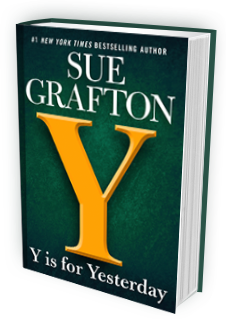Interview
Read a 1996 interview with Sue
IN CONVERSATION WITH SUE GRAFTON ABOUT "O" IS FOR OUTLAW, 1999
Q. "O" will have a particular interest for your readers because it takes Kinsey Millhone back to an unexplored area of her past. What can you tell us about the actual writing of this book?
A. I opened the new journal for 'O' on September 26, 1997, jotting down notes about possible storylines. My husband, Steve Humphrey, had come up with the title 'O' IS FOR OUTLAW several years ago and I was pretty sure I'd use it, but I also considered 'O' IS FOR OATH, 'O' IS FOR OUTCAST, and 'O' IS FOR OBITUARY or OBIT. 'Obituary' seemed too long and too awkward, and the shortened version 'obit' didn't sound like a word that would translate well into other languages. 'Outcast' isn't really crime-related and the word 'oath' simply sounded dull. I kept my options open in case a title came along that suited my purposes better, but at the outset 'Outlaw' was my working title.
Originally, I'd intended to swing back and pick up the thread of Kinsey's family, in hopes of resolving her conflicts with her grandmother and the various cousins she discovered in 'J' IS FOR JUDGMENT. Readers have expressed interest in seeing more of this aspect of Kinsey's personal history, but my psyche...or Shadow, as I typically refer to my unconscious...had other ideas. One thing I've learned in the years I've been writing this series is never to argue with my Shadow when she expresses doubt or disinterest.
In searching for the storyline, I sat at my computer for hours on end, playing 'suppose' and 'what if.' It took me until November 24, 1997 to come up with an idea that really interested me. The note in my journal on that date was brief.
What about Mickey Magruder?
Maybe it's time to hear from him.
I knew Mickey Magruder was the name of Kinsey's first husband. I knew he'd been a cop and was somewhat older than she. I also knew she'd walked out on him, but I wasn't sure why. I had no idea where he was or what had happened to him since. I began to explore that relationship and eventually discovered what had happened back in 1972 when Kinsey left. You have to understand that in many ways, I don't consider that I'm inventing the facts so much as bringing them to light. I operate in the belief that Shadow knows everything about Kinsey's life and that I'm given the information on an 'as needed' basis. Apparently, Shadow decided it was time to talk about that first marriage. I know it sounds mystical, but I suspect other writers with series characters operate in much the same manner.
I started writing Chapter 1 on January 15, 1998 and finished February 16, 1999. Eventually, I ended up with 8 separate notebooks or journals, 376 single-spaced pages of notes about the book.
Q. What about the research for this novel?
A. The research for 'O' IS FOR OUTLAW was extensive. For one thing, once I found the back story, I realized I'd be writing about events that occurred during the Vietnam War, about which I knew surprisingly little. I read ten to fifteen books, consulted a Vietnam veteran, Ray Connors, and anyone else I thought could offer me assistance. Once I realized Mickey Magruder was living in Culver City, near Los Angeles, I drove down and took notes. I talked to Dr. Marshall Morgan, the Medical Director for the Emergency Room services at UCLA. I contacted Detective Peggy Moseley of the Los Angeles Police Department, sending her a long list of questions, which she answered with remarkable patience. When I understood that part of the story took place in Louisville, Kentucky I consulted Pat Zuberer, the library clerk at Louisville Male High School. I also talked to Barry and Bernice Ewing, who run a company called Eagle Sportschairs, making wheelchairs for the disabled. In addition, I talked with Harriet Miller, the Mayor of Santa Barbara, Captain Ed Aasted and Sergeant Brian Abbott at the Santa Barbara Police Department and my friend, Erik Raney, a senior deputy with the Santa Barbara County Sheriff's Department. If you check the acknowledgements in the early pages of 'O,' you'll see that there were countless others. I'm always humbled by the generosity of the people who help me with these novels.
Q. There's an undertone of forgiveness in this story. Does that apply to your life as well as Kinsey's?
A. Actually, in my personal life I lean toward surly retorts and vicious long-standing grudges. I try not to act on these impulses, but I confess to the feelings. In this regard, Kinsey is a far better creature than I am. She tries to be fair and once she recognizes her misjudgment of Mickey, she works to set the record straight.
Q. When you wrote 'A' IS FOR ALIBI, did you ever fear you might not make it through the alphabet?
A. Hey, in case you haven't noticed, I'm not there yet. 'O' IS FOR OUTLAW is the fifteenth novel in the series. With eleven books to go, I'm still not sure I can make it. It's my intention to do so, but I'm careful to eat well, exercise, and keep my stress levels down. My biggest concern is to keep the quality of the writing as high as I can manage. As I've said many times, I'm really not interested in writing the same book more than once. I probably put more energy and ingenuity into coming up with fresh storylines than I do any other aspect of the writing.
Q. You admit that your books take place in a time warp—currently Kinsey is living in 1986, where she's been for the last few books. With ten letters of the alphabet to go, do you think you'll bring her into the present? If so, how will you...and Kinsey...deal with the explosion of technological developments in her field in the past ten years?
A. I'm still debating the issue of whether to jump Kinsey Millhone from 1986 into the present. For the moment, I prefer not to do so. When I started writing these books, I was interested in continuing the tradition of the hard-boiled private investigator. My heroes are still Raymond Chandler, James M. Cain, and Ross Macdonald. The stories they tell have nothing to do with technology and everything to do with human nature. Obviously, the modern day private detective and law enforcement experts have at their disposal a vast array of equipment and scientific techniques to aid in their pursuit of the criminal element, but I'd be willing to bet that much of the crime-solving process still comes down to skill, intuition, and experience.
Q. How do you define your success?
A. I work very very hard doing what I love best. To me success is about doing what I want to do and answering to no one...except my cats, of course.
Q. You mention exercise as a way of keeping your stress levels under control. Between the writing and working out, what can you tell us about your daily schedule?
A. I'm an early morning person. On week days, Steve and I get up at 6:00 a.m. While he's having breakfast in preparation for going into the gym, I head for the beach where I do a three mile walk with my friend, Florence. For many years, we jogged, but age and common sense persuaded us that at our ages, we're better off with less-spine jarring exercise. I'm home from the walk and in the shower by 7:30, after which I eat breakfast, usually a protein shake, and read a bit of the paper. I'm at my desk by 9:00 a.m. promptly and I work until lunch time. On a good day, I start by revising the pages I did the day before and then (with luck) I write my allotment of two pages a day. In the midst of this, of course, I'm also doing research. Often I don't realize how ignorant I am until I try to write a scene and become aware of the information that I'm lacking. In that case, I stop and read or I make a phone call or a trip out to consult one of my experts.
I break for lunch somewhere between 11:30 and noon and then I'm back in my office for maybe an hour or so. On Monday, Wednesday, and Friday afternoons, I go down to my home gym in the pool house here on the property. I do an additional thirty minutes on one of my cardio-vascular machines and then I lift weights for 45 minutes. On Tuesday and Thursday afternoons, I do a four-mile walk with my friend, Susan, or my friend, Julianna, depending on who's free. Steve and I eat dinner early, usually at 6:00 on the dot, and then we might read or watch a video. We're in bed by 9:30 or 10:00 each night. On week-ends, I write, but I do no exercise. This summer I've added a stint of Aquajogging after lifting weights. The pool is unheated, but the summer sun raises the water temperature to 82 degrees and it's heaven.
I know I sound like a fanatic on the subject of exercise, but it's the only way I know to keep my butt from getting wide. Given the fact that most writers end up sitting on their cans all day, we have to have someway to combat gravity. Exercise gives me energy and often, it's my way of keeping up with my friends.
Q. What do you do for laughs?
A. Laughs?
Q. All right. Let's put it this way...what do you do besides write and exercise?
A. Read, go to movies, have dinner with friends. Sometimes Steve and I travel, but that's only fun if it isn't for business purposes. Even then, I only like to be gone for a week. Day eight, I'm looking at my watch, wishing I could be home again. Most places on earth aren't as keen as the house I live in.
Q. Speaking of travel for business, how do you feel about book tours and public appearances?
A. I have a separate personality I adopt for those occasions. At heart, I'm an introvert, but I have an aspect of my nature that's as competitive, ego-driven, and outgoing as any extrovert's. Come tour time, I don my public persona and interact with the world with as much patience and good cheer as I can manage while exhausted. A book tour is punitive, but it has its advantages.
Q. Such as?
A. Well, I love meeting my readers, especially those I've met before or those who've become part of my mailing list. I confess I don't always recognize the name or the face...I talk to hundreds of people each time I go out on tour...and I always appreciate someone jogging my memory as they stand in line. You have to remember that when I'm on the road, all I see are the insides of airports, hotels, and bookstores. After a while, I can't tell one town from another. Usually, I haven't the faintest idea where I am or where I've been. Later, someone will ask me...how was Atlanta? Or how was Seattle? And I'm thinking, beats me. I have no mental image. I call it book tour amnesia, a form of shell shock, I'm sure.
This year, by the way, I'm touring the east coast, starting October 12, and my itinerary will be available sometime in September. It'll be posted on my website and a copy will be sent to every reader on my list.
Q. We've heard your mailing list is fast approaching the 4000 mark. Do you really write to every person on your list?
A. Sure. Given the schedule I maintain, I don't have the time to engage in lengthy or frequent correspondence. I can't be everybody's favorite pen pal, but I try to write at least once to everyone who drops me a note. I've been in touch with some of my readers for years now and we send postcards back and forth when the occasion arises. Often, a reader will write after spotting an error in one of the books. In that case, we do what we can to correct the mistake, though this isn't always possible. With the publication of each book, countless people are involved with the manuscript, reading and proof-reading. Even so, the occasional boo-boo gets by us and I just have to accept that as evidence that the world ain't perfect yet.
Q. What sorts of errors do readers catch?
A. You had to ask that, didn't you? Well, there's the famous error in 'B' IS FOR BURGLAR where Kinsey leaves her car keys in the ignition of the VW before she creeps down into some dark and spidery basement. When she's caught, she uses the very same set of keys to loosen a screw on the door she's hoping to open. Oops. Loyal readers always swear she carries a second set of keys for just such occasions. I think in 'K' IS FOR KILLER, I mention citrus trees that have dropped their leaves...which never happens in real life. In 'D' IS FOR DEADBEAT, there's a mysterious disappearing doorbell. I now claim the EDR, an Emergency Doorbell Removal crew, whipped through the neighborhood and took it out between Kinsey's visits. Others seem to view this as an inconsistency or oversight on my part. I'm sure I could think of other mistakes. Actually, it would be a great trivia quiz or contest, seeing how many errors the eagle-eyed could come up with over this series of books. On the other hand, I'm not sure I want to know. I'm a perfectionist by nature and it's tough to see how many times I've blown it.
Q. So if readers are interested in being placed on your mailing list, how do they go about it?
A. I can be reached through my post office box:
P.O. Box 41447
Santa Barbara, California 93140
Please be polite if you're commenting on a book and please try to be patient about delays in my getting back to you. Sometimes I'm off on tour and it takes a while for the mail to catch up with me. My personal assistant, Barbara Toohey, makes bi-weekly trips to the post office. She usually opens the mail so if you're being unkind or disparaging, it's her feelings you're going to hurt first. Sometimes she gets irate on my behalf if a reader is really rude, which happens on occasion. I've been known to be rude in response if a reader's attitude hits me wrong. It's not that I think I'm above criticism, but who needs it delivered in a nasty or condescending manner?
Q. Any other questions you'd care to answer?
A. Not for the moment. I have to get back to work.
For more from Sue go to Sue answers reader's questions.


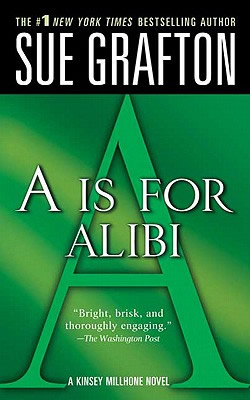 A is for Alibi
A is for Alibi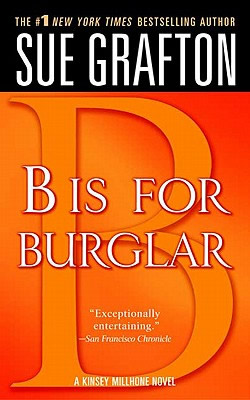 B is for Burglar
B is for Burglar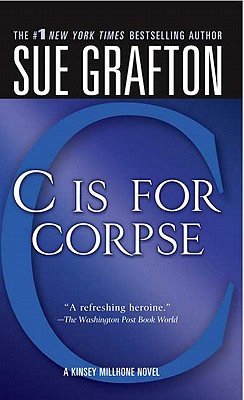 C is for Corpse
C is for Corpse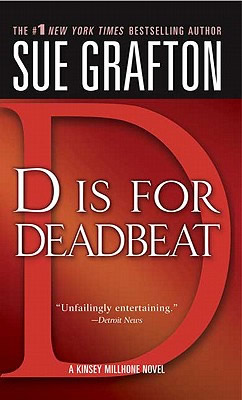 D is for Deadbeat
D is for Deadbeat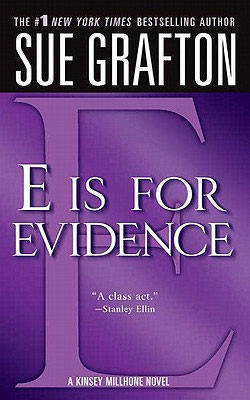 E is for Evidence
E is for Evidence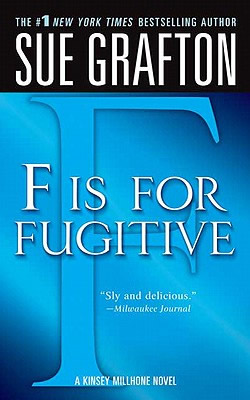 F is for Fugitive
F is for Fugitive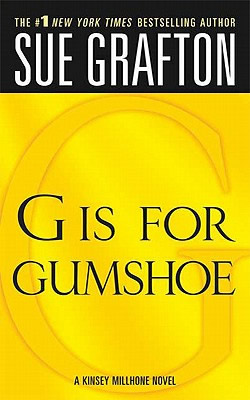 G is for Gumshoe
G is for Gumshoe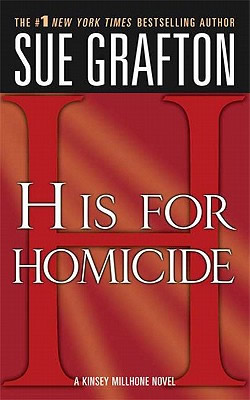 H is for Homicide
H is for Homicide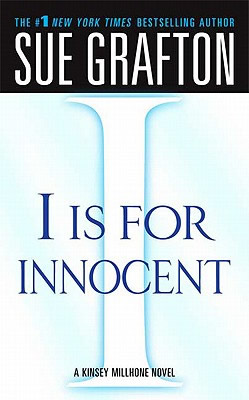 I is for Innocent
I is for Innocent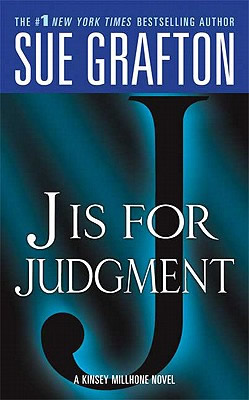 J is for Judgment
J is for Judgment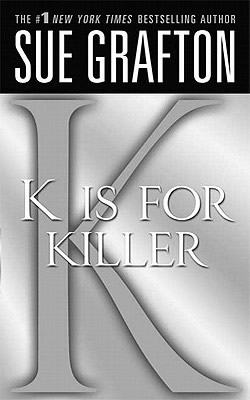 K is for Killer
K is for Killer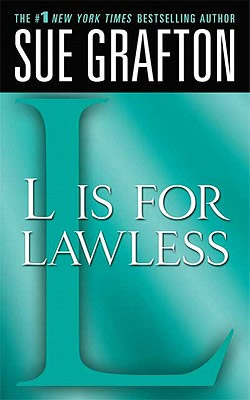 L is for Lawless
L is for Lawless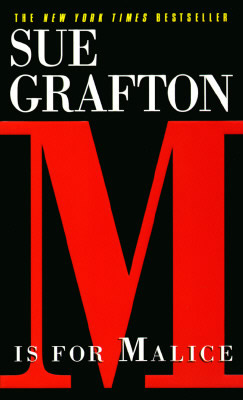 M is for Malice
M is for Malice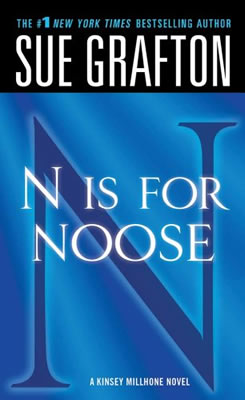 N is for Noose
N is for Noose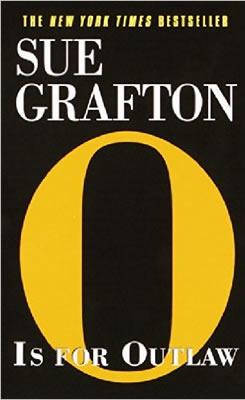 O is for Outlaw
O is for Outlaw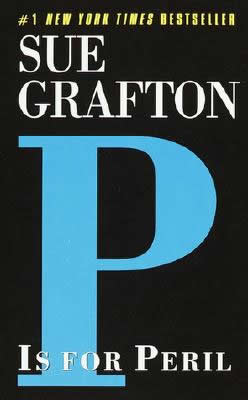 P is for Peril
P is for Peril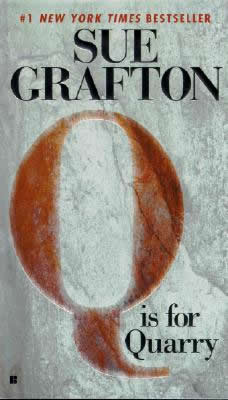 Q is for Quarry
Q is for Quarry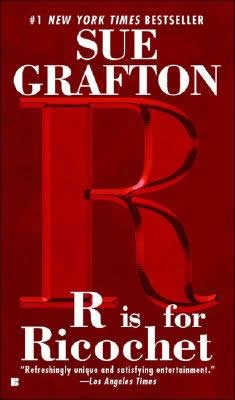 R is for Ricochet
R is for Ricochet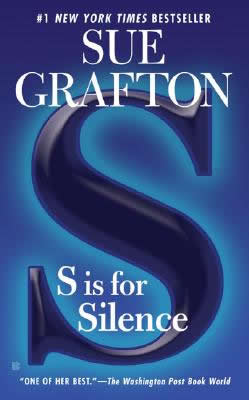 S is for Silence
S is for Silence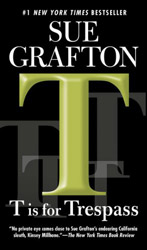 T is for Trespass
T is for Trespass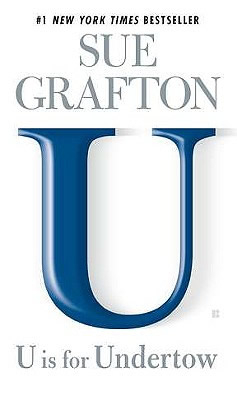 U is for Undertow
U is for Undertow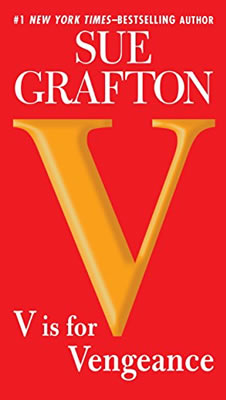 V is for Vengeance
V is for Vengeance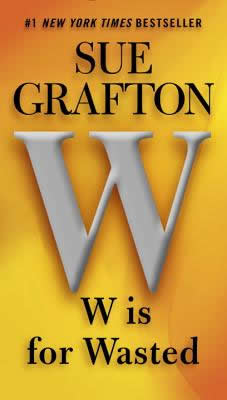 W is for Wasted
W is for Wasted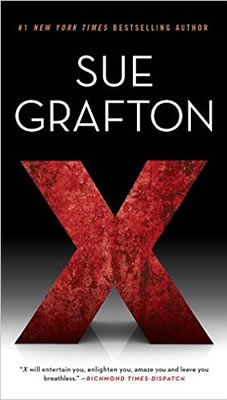 X
X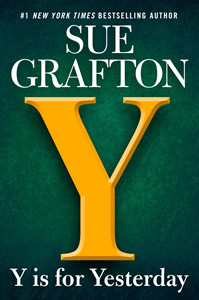 Y is for Yesterday
Y is for Yesterday